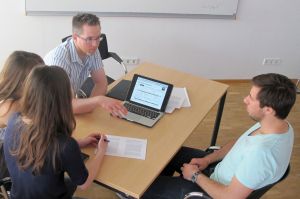Social networks are very popular for sharing photos, videos, or messages. In the future, they will not only be used for the exchange of data, but also of services. An interdisciplinary team of researchers of Karlsruhe Institute of Technology (KIT) works on an application, via which users can exchange computing capacity and, hence, increase their independence of big companies. “Social Cloud” transfers the idea of cloud computing –networking of computer hardware to bundle capacities for complex simulations – to social networks.
“We define the “Social Cloud” as a platform for the joint use of resources and services on the basis of existing relationships among users of social networks,” says Dr. Simon Caton of the Karlsruhe Service Research Institute (KSRI) of KIT. Via the “Social Cloud”, members of a platform like Facebook are given the opportunity to make available their hardware resources as a virtual part of their PC or laptop to friends on their list on a type of marketplace. In parallel, they can access their friends’ storage and hard disk capacities. The aim is to use free resources of all computers existing in the network worldwide, which would open up so far unexpected potentials. “We are building an exchange system, in which members of social networks can offer their computing capacities and accept those of others,” Caton says. He heads the Young Investigators Group developing the Social Cloud platform.
“The exchange system operates via the lists of friends of the users. Within these lists, services can be offered and accepted cost-free via the Social Cloud platform that is integrated as an app in Facebook. The Social Cloud app serves as a communication platform for the users,” Caton says. Such a cloud is of interest to persons spontaneously needing above-average computing power, for example for the processing of video files, for simulations, or back-ups.
Presently, the Social Cloud is being developed and tested. A test run with test persons is planned to take place this year. Then, selected participants will test the Social Cloud as an application for Facebook with their friends in the network.
Prior to the test, the scientists will also study central issues like trust and data security from the technical, economic, and sociological points of view. Established encoding technologies and processes to check and execute or block programs of unknown providers of internet pages are to ensure maximum security. The users can define flexibly who of their friends is allowed to access which computing capacities. Moreover, every user is to be able to look into the connection to a user of his resources and to disconnect this user by pushing a button. “Every user will always retain the authority over the own computer and decide what will be done with the PC or not,” Simon Caton explains.
From the economic point of view, the scientists are interested in which market mechanisms distribute the available resources efficiently. The focus lies on preference-based mechanisms that take into account with whom the users want to share: For example with friends, in the case of which mutual trust is highest. The sociologists analyze the social and cognitive processes strengthening the exchange of resources among members of a social network. “We observe that trust networks in which resources are shared often are not identical with the networks of friends,” Caton says.
More information: www.ksri.kit.edu/socialcloud.php and www.facebook.com/SocialCloudComputing
Literature: S. Caton, C. Haas, K. Chard, K. Bubendorfer, O. Rana; A Social Compute Cloud: Allocating and Sharing Infrastructure Resources via Social Networks. IEEE Xplore Digital Library: http://ieeexplore.ieee.org/xpl/articleDetails.jsp?reload=true&arnumber=6727497
Digital Press Kit Relating to the Science Year 2014
Communication, energy supply, mobility, industry, health care, leisure time: Digital technologies have long been part of our everyday life, they open up new opportunities and offer solutions for problems of society. At the same time, they pose challenges. Opportunities and risks will be in the focus of the Science Year 2014 – The Digital Society. At the KIT, researchers of all disciplines study various – technical and societal – aspects of digitization. The digital press kit of KIT relating to the Science Year 2014 contains short portraits, press releases, and videos: http://www.pkm.kit.edu/digitalegesellschaft

